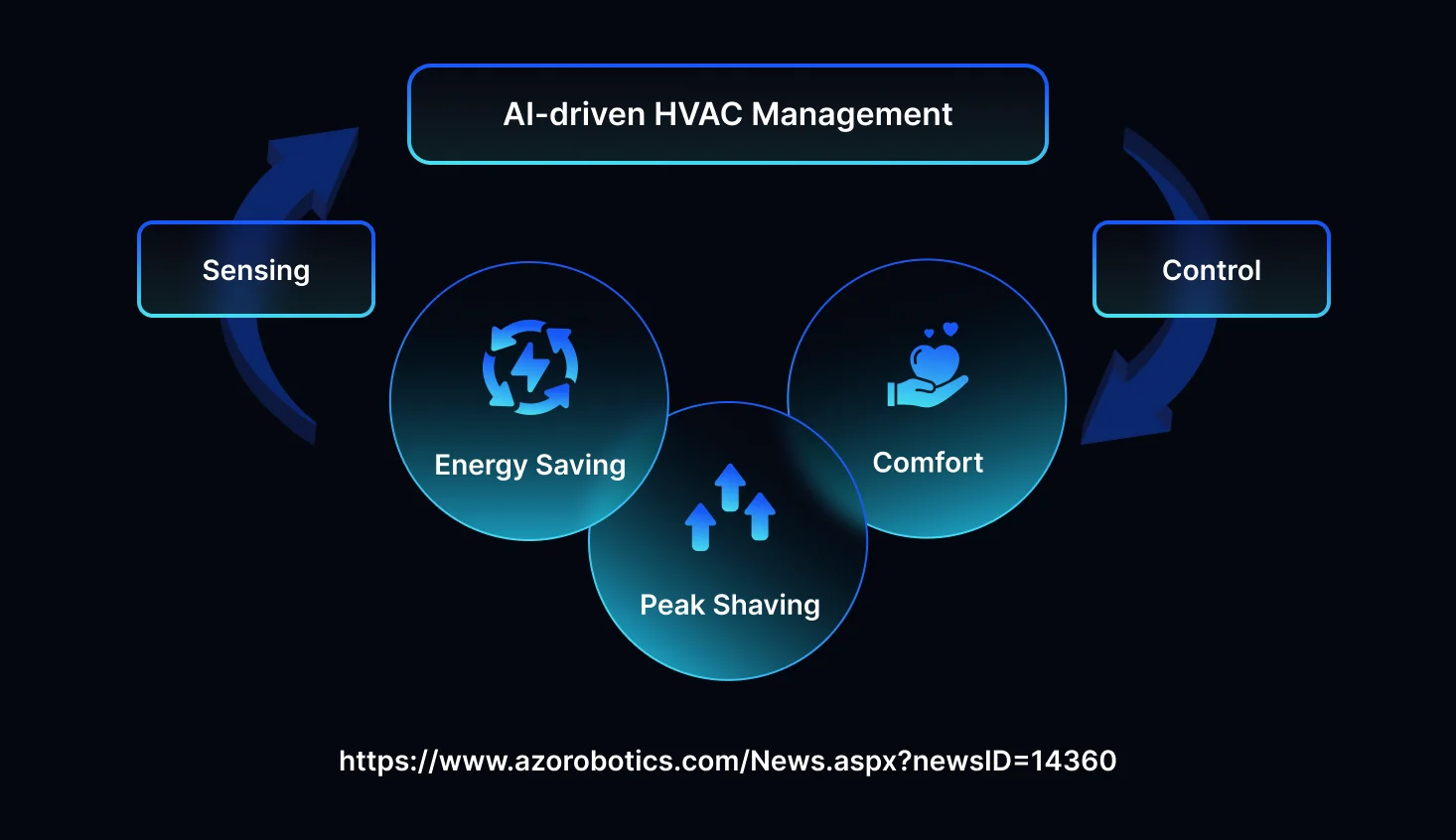With rising energy costs and growing pressure to improve efficiency, HVAC companies are under intense demand to modernize and transform from just mechanical equipment with manual maintenance into data-driven ecosystems powered by artificial intelligence. HVAC AI agents drive these changes and set global market trends. However, if you want to benefit from them, you should know how to use them to support your operations.
Explaining HVAC AI Agents
Not long ago, most HVAC systems ran on fixed timers or relied on staff to make manual adjustments, often wasting energy when no one was around or failing to respond quickly to changing conditions. Today, AI agents change everything. They are autonomous software that helps adjust equipment depending on external conditions without human intervention, which means consuming fewer resources. Instead of waiting for visits from engineers, it scans room temperature and weather conditions to regulate settings automatically. It educates from past usage patterns over time and chooses optimal settings to maintain comfortable indoor environments.
For HVAC businesses, AI agents create new opportunities to improve operations, minimize maintenance expenses, and attract new clients thanks to innovative services.
There are several forms of AI agents in this area, each developed to support specific business functions. Some are embedded directly into thermostats and zoning systems, where they autonomously fine-tune climate settings based on occupancy, usage patterns, and outside weather. Others are added into the FSMs to assist dispatchers with planning timetables and sending technicians to fix problems.
In customer service, conversational AI agents handle inquiries, appointment bookings, and basic troubleshooting through chat or voice interfaces. More complex agents operate within building management systems, analyzing sensor inputs to optimize large-scale HVAC work; they aim to lower energy waste and anticipate maintenance needs.
Aligning with Green Standards and ESG Expectations
Now, we want to touch on a critical aspect. Governments, property developers, and end users prioritize stringent sustainability standards, including LEED certifications and net-zero goals, and HVAC AI agents allow service providers to stay on top of global trends by reducing the real results of energy consumption and carbon emissions, delivering compounding environmental returns year after year.
Globally, adopting intelligent solutions serves both sides. They lower clients’ energy bills and make the provider a forward-thinking, eco-conscious partner. HVAC AI-powered solutions are a competitive advantage for contractors bidding on large-scale commercial projects or working with institutions prioritizing ESG compliance.
5 Ways You Can Use AI Agents in the HVAC Domain

Despite initial hesitation from many companies, artificial intelligence is quickly proving its value in the HVAC industry. Unlike basic automation tools, HVAC AI agents continuously learn and adapt. They analyze fresh data in real time and improve their settings, growing their value in dynamic environments, such as large commercial buildings or multi-unit facilities, where energy demand and occupancy fluctuate throughout the day.
By acting as a decision-making layer between hardware and user preferences, agents improve system responsiveness and minimize manual system management, saving time and resources while maximizing comfort.
Minimize Emergency Callouts and Costs on Maintenance
HVAC service providers spend a lot of resources on urgent callouts. The long-term goal of each company is to lower expenses and optimize the heating, ventilation, and air conditioning system work. AI agents embedded in HVAC systems function around the clock, screening incoming data from a network of sensors that track temperature, humidity, airflow, pressure, power consumption, and other parameters to detect anomalies and alert technicians before equipment failures. Such a proactive approach helps HVAC providers reduce emergency callouts, lower maintenance costs, and increase client satisfaction. By forecasting service needs, businesses will shift from reactive repairs to planned interventions, extending the lifespan of critical assets.
For HVAC providers managing multiple client sites or servicing commercial buildings, predictive maintenance enhances reliability but also positions the business as a trusted partner focused on long-term value.
Cover Each Appointment
Well-orchestrated service is critical when managing dozens of appointments daily. Scheduling and dispatching are the most practical applications of HVAC AI agents. They screen multiple real-time variables such as technician skillsets, traffic conditions, job urgency, geographic proximity, and appointment history to automatically assign the right technician to the right job at the right time.
By automating these decisions, HVAC companies can reduce travel time, minimize idle hours, and increase the number of service calls completed each day. Integrations with CRM platforms also ensure technicians are equipped with customer history and job details, further streamlining the visit and improving first-time fix rates.
24/7 Virtual Customer Support
Chatbots, voice AI assistants, or automated messaging tools provide round-the-clock assistance to customers without hiring extra staff. Virtual receptionists can handle routine inquiries, book appointments, provide pricing estimates, and answer product-related questions. For small to mid-sized firms, this means lower overhead and the ability to offer top service without hiring a large administrative team. Clients receive information and solve problems when they need it.
Also, virtual customer support improves lead capture since customers can engage with the business at any time of day through the website, social media, or mobile app. Conversational solutions like MetaDialog can handle more than 87% of customer conversations and lighten the burden on staff.
Energy Efficiency Optimization
Central cooling and heating equipment are among the largest energy consumers in buildings. AI agents control them by dynamically adjusting the settings based on current needs. For example, when a building is empty during holidays or outside temperatures change rapidly, an AI HVAC agent will automatically lower energy consumption while maintaining comfort when people return. Over time, the system learns specific patterns, like peak usage hours or seasonal variations, and adapts accordingly to maximize performance.
The environmental benefits are equally compelling. AI-powered optimization tools support ESG goals by significantly reducing carbon emissions and energy waste. HVAC providers offering such solutions meet the demands of eco-conscious clients and tap into new revenue streams, including energy-as-a-service models and green building certifications.
Billing and Reporting
Administrative work often slows down operations and is prone to mistakes. With AI, it is possible to form accurate invoices and service reports based on job data, technician notes, and predefined templates. In some platforms, AI is able to translate voice notes or turn job-site photos into formatted reports.
This reduces manual effort for back-office staff, ensures faster billing cycles, and enhances customer trust through accurate documentation. If you are a multi-location provider or franchise, automation will also enforce consistency and compliance across teams.
Challenges and Limitations
While HVAC AI agents offer clear operational and environmental benefits, integrating them into day-to-day workflows comes with several challenges. For many companies, the initial investment in AI platforms, IoT sensors, and backend integration can be a significant barrier, because the return on investment isn’t immediate. SMBs may find it difficult to justify these costs without a clear roadmap for value generation.
Besides cost, there are several technical and operational issues companies must navigate. AI systems require massive datasets, but many HVAC firms struggle with fragmented records or outdated databases. Cloud-based tools also depend on consistent connectivity, which may not be available at every job site. Finally, teams accustomed to manual workflows may be hesitant to trust or adopt automated processes without proper onboarding.
Other limitations include:
- Poor data quality that hinders predictive performance
- Frustrated employees due to the unknown software
- Intensifying regulations surrounding AI and data privacy
Despite these hurdles, companies with a phased, well-supported approach often get significant payoffs. Once implemented, AI agents help HVAC businesses stay competitive in a market driven by performance and ecological responsibility.
Bottom Line
HVAC services using AI are moving toward cost-effective ways to serve their clients. AI agents streamline operations while supporting sustainability goals. As client expectations and regulations continue to evolve, providers adopting these tools have every chance to position themselves as market leaders.
To empower your customer support service, we offer to try our conversational AI system that streamlines customer interactions. You can use the MetaDialog platform to respond to client questions and manage service inquiries across multiple channels. It’s a scalable and affordable solution that improves responsiveness and saves your resources.
